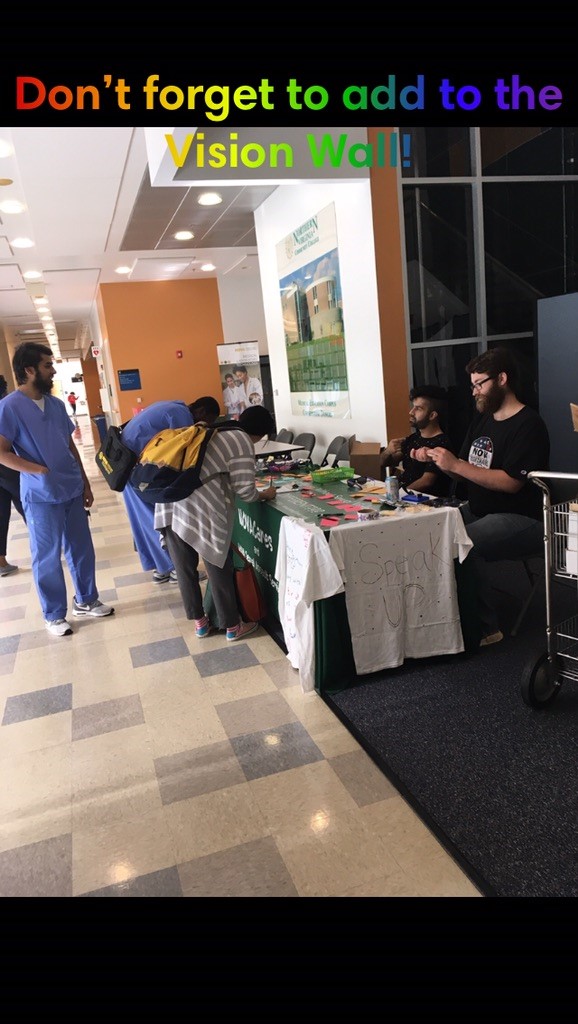 Help us spread awareness and show support to victims and survivors by participating in The Clothesline Project. Happening at the MEC today (October 3) and tomorrow from 10am – 3pm!
Help us spread awareness and show support to victims and survivors by participating in The Clothesline Project. Happening at the MEC today (October 3) and tomorrow from 10am – 3pm!
NATIONAL DOMESTIC VIOLENCE AWARENESS MONTH
National Domestic Violence Awareness Month is an annual designation observed in October. For many, home is a place of love, warmth, and comfort. It’s somewhere that you know you will be surrounded by care and support, and a nice little break from the busyness of the real world. But for millions of others, home is anything but a sanctuary. The U.S. Department of Justice estimates that 1.3 million women and 835,000 men are victims of physical violence by a partner every year.
Every 9 seconds, a woman in the U.S. is beaten or assaulted by a current or ex-significant other.
Here’s another shocking statistic: the number of U.S. troops killed in Afghanistan and Iraq between 2001 and 2012 is 6,488. The number of women that were murdered by current or ex-male partners during that same time frame is 11,766, according to the Huffington Post. That’s almost double the number of people that were killed fighting in war. People who are in an abusive relationship will stay with their partner for a number of reasons:
-Their self-esteem is totally destroyed, and they are made to feel they will never be able to find another person to be with.
-The cycle of abuse, meaning the ‘honeymoon phase’ that follows physical and mental abuse, makes them believe their partner really is sorry, and does love them.
-It’s dangerous to leave. Women are 70 times more likely to be killed in the weeks after leaving their abusive partner than at any other time in the relationship, according to the Domestic Violence Intervention program.
-They feel personally responsible for their partner, or their own behavior. They are made to feel like everything that goes wrong is their fault.
–They share a life. Marriages, children, homes, pets, and finances are a big reason victims of abuse feel they can’t leave.
HOW TO OBSERVE
Use #DomesticViolenceAwareness to post on social media. Sometimes, people don’t know if they are really in an abusive relationship because they’re used to their partner calling them crazy or making them feel like all the problems are their own fault. Here are a few ways to know if you’re in an abusive relationship that you need to get out of.
- Your partner has hit you, beat you, or strangled you in the past.
- Your partner is possessive. They check up on you constantly wondering where you are; they get mad at you for hanging out with certain people if you don’t do what they say.
- Your partner is jealous. (A small amount of jealousy is normal and healthy) however, if they accuse you of being unfaithful or isolate you from family or friends, that means the jealousy has gone too far.
- Your partner puts you down. They attack your intelligence, looks, mental health, or capabilities. They blame you for all of their violent outbursts and tell you nobody else will want you if you leave.
- Your partner threatens you or your family.
- Your partner physically and sexually abuses you. If they EVER push, shove, or hit you, or make you have sex with them when you don’t want to, they are abusing you (even if it doesn’t happen all the time.)
HISTORY
Domestic Violence Awareness Month evolved from the “Day of Unity” held in October 1981 and conceived by the National Coalition Against Domestic Violence. The “Day of Unity” soon evolved into a week, and in October of 1987, the first National Domestic Violence Awareness Month was observed. In 1989 Congress passed Public Law 101-112, officially designating October of that year as National Domestic Violence Awareness Month. Such legislation has been passed each year since.
As this month comes to an end, the important discussion it brings to the forefront about domestic violence’s horrific repercussions should not.
If you are experiencing domestic abuse, please click here for help. If you are in danger, call 911.
 Abusive relationships come in all different shapes and sizes. If your partner doesn’t let you wear certain things or gets upset when you wear certain clothing in public, that is abuse. If your partner gets upset at YOU when other people give you attention you may not have wanted, that is also abuse. Physical violence isn’t the only form of abuse. To find resources or get more information on domestic violence (dating/partner violence), visit http://www.nvcc.edu/novacares/sas/dating.html. To contact a 24 hour NOVA Sexual Assault Services coordinator for free confidential support, please call 703.338.0834 or email NOVA.SAS@nvcc.edu.
Abusive relationships come in all different shapes and sizes. If your partner doesn’t let you wear certain things or gets upset when you wear certain clothing in public, that is abuse. If your partner gets upset at YOU when other people give you attention you may not have wanted, that is also abuse. Physical violence isn’t the only form of abuse. To find resources or get more information on domestic violence (dating/partner violence), visit http://www.nvcc.edu/novacares/sas/dating.html. To contact a 24 hour NOVA Sexual Assault Services coordinator for free confidential support, please call 703.338.0834 or email NOVA.SAS@nvcc.edu.



































